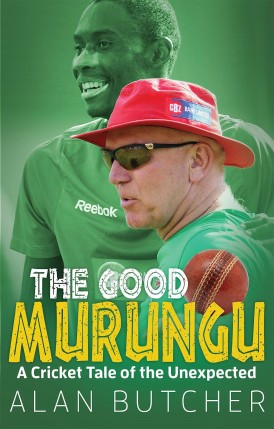The Good Murungu
Martin Chandler |Published: 2016
Pages: 287
Author: Butcher, Alan
Publisher: Pitch Publishing
Rating: 4 stars

There can’t be many professional cricketers who have never done any coaching, and for a substantial number that is where their career takes them once their playing days are over. Yet when memoirs come to be written, or some enthusiast takes the trouble to write a biography, the years of coaching almost always fly by in a couple of sentences. As I write this review I am struggling to think of a single one that dwells on the subject to any extent at all.
All of which means that for me, and I suspect most other cricket lovers who have never played the game to a high standard, the assumption was always that the top and bottom of coaching and all points in between took place in a net. Looking back I suppose I should have worked out that wasn’t the case, but it wasn’t until I read The Good Murungu that I learned it included exercises like a group of players being given a packet of spaghetti and some bluetack and then tasked with using them to construct something that will stay together for a period in excess of two hours.
Author Alan Butcher was a decent player himself. He played once for England in a Test and, in a not particularly happy double, once in an ODI. He didn’t let himself down in either appearance, getting two starts in the Oval Test in 1979, a match famous for India’s magnificent attempt to chase down 439 for victory a target that, had it not been for some negative tactics from Mike Brearley, they would have reached. His ODI came the following summer against Australia. Butcher came in at number three to join Geoffrey Boycott after an opening partnership of more than 100 with Graham Gooch had given England a decent start. He scored 14, but got bogged down and perished trying to accelerate. Brother Ian and sons Gary and England’s Mark also made careers in the game.
During his first spell as Surrey coach it was Butcher’s coaching input that finally turned Mark into a successful Test batsman. His second stint at the Oval ended at the conclusion of the 2008 summer in which an aging side were relegated without winning a single match. There is nothing in The Good Murungu about Butcher’s playing career, but the occasional nod back to previous coaching jobs does emerge. There was a period of unemployment after the Surrey job before, in February 2010, an offer came of a three year contract to be the coach of Zimbabwe Cricket.
The Good Murungu is about what happened to Butcher and to Zimbabwean cricket over the duration of that contract, so it is a sort of an autobiography. From a country whose cricket has not been properly chronicled it is certainly the definitive history of the period, and there are elements of a travel guide about the book as well.
Butcher’s tenure began with Zimbabwe building back up to playing Tests again, and included their initial forays back into that arena. It helps that much of what happened was outside the game’s mainstream, so only a reader devoted to the Zimbabwean game will be entirely confident about what the next chapter will bring, although the cricket itself is rarely examined in any great detail.
The story is a highly personal one in which Butcher examines the problems he was faced with in doing his job, the often different difficulties encountered by his players and his employers, and those with whom he found himself in conflict. He had few problems with the players, and some very good working relationships with others involved in Zimbabwe Cricket. There were however other individuals with whom there were issues that were to prove intractable.
One thing that surprised me was to learn how peaceful, in comparative terms, living in Zimbabwe was. Butcher came into contact with some low level abuses of power by those in authority, and some criminal behaviour, but he paints nothing like the sort of picture Henry Olonga described in his autobiography, Blood, Sweat and Treason. Given that Olonga’s book was published just after Butcher took up his post, and must therefore have been completed not too long before then, the only conclusion that can be drawn is that the place has indeed improved in recent years.
The Good Murungu comes to market soon after the same publisher’s recent book from Nihar Suthar regarding Afghanistan, and whilst there is perhaps more cricket in Butcher’s book the two authors both step well outside the mainstream of cricket writing and produce results that can fairly be described as unique. I hope Alan Butcher and Pitch are rewarded with some healthy sales figures, and that the latter continue to look beyond the obvious for their future output.






Leave a comment